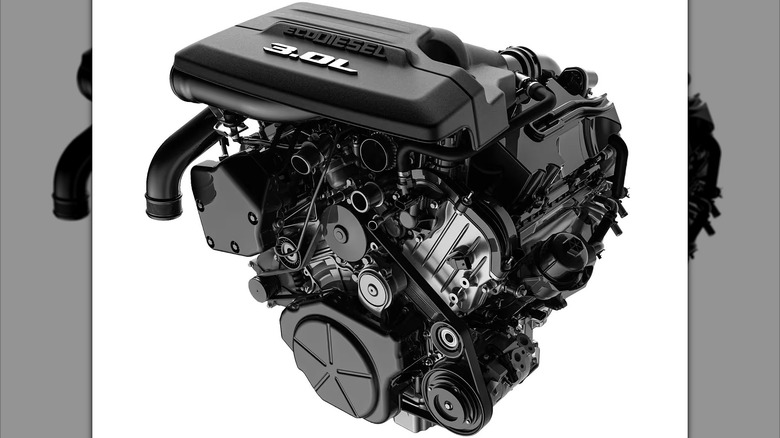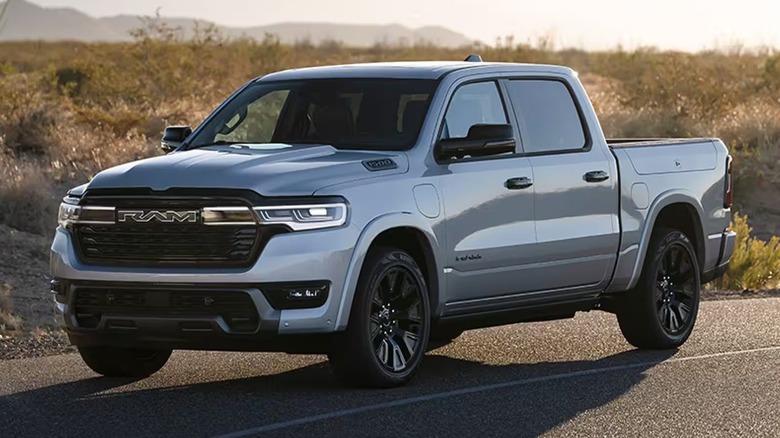Why Was The RAM 1500 EcoDiesel Discontinued?
For fans of raw towing power, the news that Ram and Jeep were no longer going to offer the 3.0-liter EcoDiesel engine beyond 2023 was somber. According to Netherlands-based Stellantis, which owns Ram, the decision was part of the company's new focus on electric vehicles.
However, another reason for the discontinuation is likely the mounting emissions fines Stellantis faces, which number in the millions. In late 2024, Stellantis was ordered to fork over $4.2 million in a settlement with the California Air Resources Board (CARB), due to some alleged shenanigans involving an emissions-defeating device included on some of Ram's 3.0-liter diesel engines.
This wasn't the first time a Stellantis brand was fined, either, as Stellantis-owned Dodge discontinued the Hemi engine after it couldn't meet new emissions standards and incurred $235 million in penalties. In place of these engines, Stellantis is now focusing on its Hurricane turbocharged gasoline engines and electric power, with the automaker teasing the Ram 1500 Ramcharger EV truck that's set to launch in 2026.
The EcoDiesel ran for nine years in the US
Launched in 2011, the VM Motori-developed 3.0-liter EcoDiesel first appeared in European Fiat and Chrysler vehicles. The second-generation version, the L630, launched in the U.S. in 2014 with adaptations to meet stateside emissions standards. This V6 diesel delivered 240 horsepower and 420 lb-ft of torque. Unfortunately, the first U.S. iteration would end up being one of the worst years for the Ram EcoDiesel, at least according to owners.
However, this engine did provide glimmers of its potential, especially in terms of how fuel-efficient a diesel truck could be. It offered an EPA-estimated 28 miles per gallon on the highway, another example of how diesel engines are more efficient than gas.
The engine improved even further by its third generation, which would be its last. The 2023 EcoDiesel provided 260 horsepower, 480 lb-ft of torque, and a maximum towing capacity of 9,600 pounds. It was also efficient enough that a 4x4 Ram 1500 could travel more than 950 miles on one tank of fuel.
Is the electric-powered truck the future?
With bold claims like a 690-mile range and a max towing capacity of 14,000 pounds, the Ram 1500 Ramcharger EV truck certainly has a lot to live up to when it's released. Ram is quite late to the party, as brands like Ford and Rivian have had options available for the last few years. Despite that, high sticker prices have been a massive hurdle for many interested in an electric pickup. Can the Ramcharger shake up the market with something more affordable? Only time will tell.
Another issue that plagues EV trucks is the unfavorable relationship between towing and range. While you may be able to travel significant distances in your electric pickup, the range can drop more than 50% once you add heavy loads such as a weighed-down trailer.
The limited range while towing can affect your charging experience as well. Many charging stations will require you to unhitch your trailer in order to access power, which is an inconvenience compared to common pull-through fuel pumps. In addition, while you may find plenty of opportunities to charge along the interstate, your chances of locating something off the beaten path fall significantly. For some, these drawbacks may be the reason why your next truck should be gas-powered, not electric.


